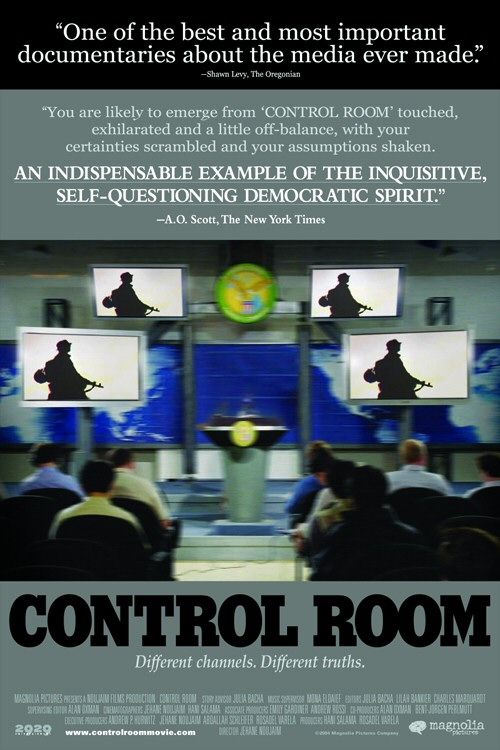“A More Reasoned Discussion of Media and War”

| None | Light | Moderate | Heavy | |
|---|---|---|---|---|
| Language | ||||
| Violence | ||||
| Sex | ||||
| Nudity |
What You Need To Know:
At the core, this is a movie about media – how it manipulates and how it is manipulated – and perspectives, saying that no single human perspective can be complete and correct. CONTROL ROOM is an engaging discussion for those interested in understanding the American and Middle Eastern cultural conflicts. While viewers may not agree with everything said in the interviews, they’ll find plenty to talk about on the way home.
Content:
(H, AP, L, VV, D, M) Light humanist worldview that focuses only on media and governments, with a mild anti-American stance but also anti-Hussein and anti-Iraqi government content; seven obscenities and two profanities, most uttered by soldiers; images of war violence include intact corpses, bloodied and injured civilians, and bombs falling on buildings; reporters smoke off-screen; and, governments lie and manipulate media.
GENRE: Documentary
More Detail:
The film’s thesis is stated at the beginning by Al-Jazeera senior producer Sameer Khader: “You cannot wage a war without propaganda.” The claim unfolds that both Western and Arab journalists deliver information with a locally nationalistic slant, and that, in addition to that natural bias, they are fed exaggerations and sometimes mistruths by their governments. The wide gulf between what coalition countries are told and what Arab countries are told cannot help but strengthen the acrimony and misunderstandings between the two peoples.
Some work is done to humanize Al-Jazeera, though the filmmakers are obviously making an attempt at balance. Secretary of Defense Donald Rumsfeld deemed the Arab news channel the “mouthpiece of Osama bin Laden,” but CONTROL ROOM suggests that he was angry not because Al-Jazeera was dishonest, but because they were not presenting war coverage in the same American-spun manner as White House press agents. One issue of contention was over the Arab channel airing photographs of American casualties, which the U.S. called cruel. However, at that time, U.S. news outlets were routinely publishing photographs of dead Iraqi soldiers, creating a have-your-cake-and-eat-it scenario.
Also, both Arab and U.S. channels aired news from their governments without any photographic or videotaped evidence of it being true. The most famous instances of this problem were the insane claims made by the Iraqi Minister of Defense which bore little resemblance to reality but were still roundly reported in the Middle East.
It is difficult to claim that Al-Jazeera is anti-American after senior producer Khader says that he would eagerly work for Fox News Channel if given the chance and that he hopes his children will be educated in and live in America. One of their most active reporters, Hassan Ibrahim, finds many factual problems in the wartime propaganda that the U.S. releases, but says he has “complete faith in [the United States’] Constitution and people.”
Lt. Josh Rushing, a thoughtful, well spoken representative for the U.S. Army, recounts a day when he saw gruesome footage of American soldiers and became nauseated from the sight. He soon remembered that on the previous day, he had seen similar footage of Iraqi soldiers and almost shrugged it off. This realization is part of the movie’s point, that wartime violence is a terrible misfortune, regardless of the reasons. Rushing concludes, “It makes me hate war, but it doesn’t make me think we can live in a world without it yet.”
Amazingly, given its subject matter and the current political climate, the movie does not have a sensational tone. It is straightforward, although not all of the claims are clearly substantiated (one of the pitfalls of the medium, versus the documentation necessary in book form).
At the core, this is a movie about media: how it manipulates and how it is manipulated. It does not disrespect Lt. Rushing for saying that war is necessary, nor does it mock or blame U.S. policy. It does, however, implicate the effort to ‘spin’ information as being misleading and harmful. It is a movie about perspectives, saying that no single human perspective can be complete and correct.
CONTROL ROOM is an engaging discussion for those interested in understanding the American and Middle Eastern cultural conflicts. Viewers may not agree with everything said in the interviews, but they’ll find plenty to talk about on the way home.


 - Content:
- Content: 



